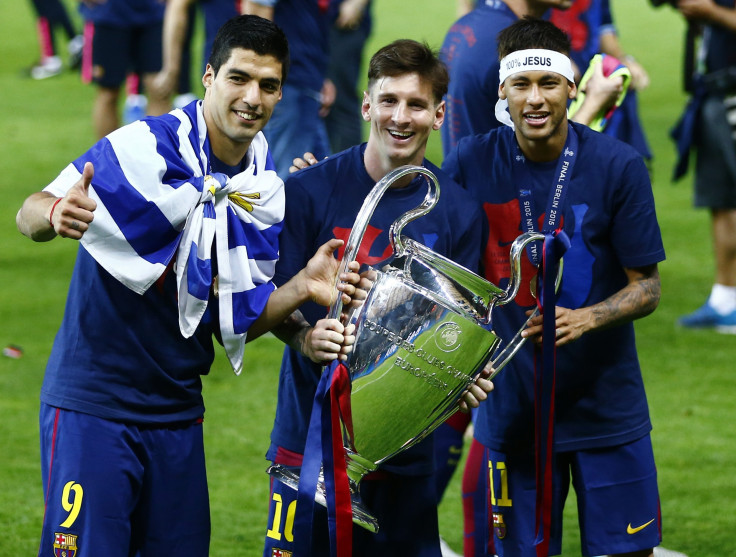Lionel Messi, Neymar, Luis Suárez Part Of The Greatest Barcelona Team Ever?

With the last kick of the game, the last kick of the season, Neymar settled the Champions League final and took the total number goals scored between Barcelona’s phenomenal front three to 122. It was a fitting finale to a debut season under Luis Enrique that rebounded from a mid-term crisis to end with the second ever treble in Barcelona’s distinguished history.
Juventus pushed the Catalan giants harder than many expected in Saturday’s Champions League final in Berlin, but ultimately they proved just the latest team unable to contain the threat of an attacking trident that must already go down as one of the best ever.
It has been Lionel Messi’s willingness to adapt to a more withdrawn role following the integration of Luis Suárez into the team that has proved pivotal. And that was in plenty evidence in the German capital. It was Messi’s cross-field pass that accelerated a wonderful flowing move to produce the first goal just four minutes in -- aptly demonstrating the blend between individual talent and collective interplay that has characterized this Barcelona team and in particular their front three.
After Juventus had pulled level, Messi’ trademark jinking run led to a shot that was spilled by Gianluigi Buffon to allow Suárez, fully displaying his eagerness and eye for goal, to crucially put Barcelona back in front. That would have been enough but Brazilian star Neymar had the last word, taking the ball on with one thought in mind and finding the back of the net.
The celebrations followed seconds later as the squad and coaching team celebrated matching the achievements of Pep Guardiola’s first season in charge by landing a clean sweep of major trophies in a single season.
Rather than the 2009-2009 Guardiola vintage, however, for many it is his side of two years later, which claimed La Liga and Champions League titles, which is the standard-bearer. It was a team that scaled the summit of the short passing and high pressing style that has been in the club’s DNA for more than decades.
Ever since, first with Guardiola and then in his absence, Barcelona have been struggling to decipher how, with many of the players still remaining, to move on from that pinnacle. During that intervening time Barcelona have often appeared a club lacking a true direction either on or off the pitch. And for the first half of this season that looked like it was continuing.
Enrique, a former teammate of Guardiola’s at the Camp Nou, arrived with a short, mixed record as a coach. And plenty of criticism was directed his way in those early months, with players being frequently rotated and little pattern emerging. After Barcelona lost 1-0 to Real Sociedad in the first match back from the winter break, Messi, who had been started on the bench, missed training, the club’s sporting director and his assistant were gone and presidential elections were called. It appeared that Enrique would be fortunate to see out the season. His uneasy relationship with the club, and perhaps some of the players, too, is demonstrated by the fact that, even as he celebrated winning every trophy on offer this season, his future remained in doubt.
While few are sure how much of Barcelona’s mid-season turnaround, which led to them winning 30 of their final 35 matches, was down to Enrique, it is clear he must get ample credit. Enrique has not attempted to emulate and surpass Guardiola’s team, as was evidenced in the Champions League final. After going in front, the Barcelona of Guardiola would likely have strangled the game, denying the opposition hope through dominating possession. On Saturday that didn’t happen, and consequently Juventus will always have felt they had a chance, even before equalizing and then threatening to go in front. But what this Barcelona team arguably possesses as an advantage over Guardiola’s great 2011 team is the constant threat of penetrating the opposition backline.
Ahead of leading his Bayern Munich team into battle against his former club in the second leg of the Champions League semifinal, Guardiola described Barcelona as “the best counter-attacking team in the world.” To some it was seen as a criticism of what Barcelona have lost since his exit. But given his relationship with Enrique, it was far likelier to have been high praise of what they have gained. Whatever the truth, there is no doubt that his statement was accurate.
One of the key shifts has been in the phasing out of the man who defined Barcelona’s tiki-taka style more than anyone -- Xavi. In his place this season has come a player in Ivan Rakitic who plays and moves more vertically and more directly, taking Barcelona from back to front at greater pace. It was Rakitic making the move forward that got him the opening goal against Juventus and then his quick forward pass that set up Messi for Barcelona’s second. Both of Barcelona’s second-half goals came with the type of rapid breaks that they now excel at with the individual, cutting edge quality of their front three. Whereas, Guardiola’s team had Pedro, the ultimate role player, this version has Neymar and Suárez -- sublime talents who have adapted their games, like Messi, to maximize their collective effectiveness.
There may never be a team that replicate what Guardiola’s side did at Barcelona, but the sport has always been about evolving and finding new ways to win. And with Messi, Neymar and Suárez spearheading a new-look Barcelona, this season’s treble may prove to be only the beginning of a new era of dominance.
© Copyright IBTimes 2024. All rights reserved.











